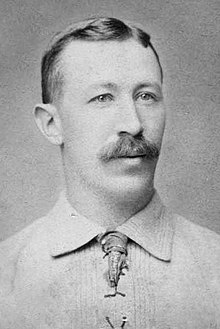Buck Ewing
| Buck Ewing | |||
|---|---|---|---|
 |
|||
| Catcher / Infielder / Outfielder | |||
|
Born: October 17, 1859 Hoagland, Ohio |
|||
|
Died: October 20, 1906 (aged 47) Cincinnati |
|||
|
|||
| MLB debut | |||
| September 9, 1880, for the Troy Trojans | |||
| Last MLB appearance | |||
| May 27, 1897, for the Cincinnati Reds | |||
| MLB statistics | |||
| Batting average | .303 | ||
| Home runs | 71 | ||
| Runs scored | 1,129 | ||
| Runs batted in | 883 | ||
| At bats | 5,363 | ||
| Teams | |||
|
As Player
As Manager |
|||
| Career highlights and awards | |||
|
|||
| Member of the National | |||
|
|
|||
| Inducted | 1939 | ||
| Election Method | Veteran's Committee | ||
As Player
As Manager
William "Buck" Ewing (October 17, 1859 – October 20, 1906) was an American Major League Baseball player and manager, and is widely regarded as the best catcher of his era and is often argued as one of the best players of the 19th century.
Born in Hoagland, Ohio, Ewing joined the National League in 1880 as a member of the Troy Trojans, but rose to stardom in 1883 as a member of the New York Gothams, later known as the Giants. That year he would hit 10 home runs (a feat he would never repeat), while batting .303. Playing in an era when triples were more common than home runs due to the spacious parks and poor quality of the balls used, he led the league in 1884 with 20 triples, and was often among the league leaders.
Ewing was equally renowned for his defensive abilities. Writing in the 1938 Spalding Guide, John Foster said of him, "As a thrower to bases Ewing never had a superior, and there are not to exceed ten men who could come anywhere near being equal to him. Ewing was the man of whom it was said, "He handed the ball to the second baseman from the batter's box." Primarily a catcher, Ewing was versatile enough to play all nine positions and fast enough to steal 354 bases. He hit .300 in ten different seasons.
Playing until 1897 with the Giants, Cleveland Spiders and Cincinnati Reds, Ewing posted consistently superb offensive numbers. Arguably his best season was in 1893 with the Spiders when he batted .344 with 6 home runs, 122 RBI, 47 stolen bases and 117 runs.
In 1890, when a player revolt led to the formation of the short-lived Players' League, Ewing led the New York franchise as both star player and manager. Lingering resentment in the wake of the league's establishment and demise has often been suspected as a reason for his limited play in 1891 and subsequent move to Cleveland following the 1892 season. Ewing finished his career with a .303 lifetime batting average, 71 home runs, 883 RBI, 1129 runs, 250 doubles and 178 triples – totals made more impressive by the fact he was playing annual seasons only 100-130 games long.
...
Wikipedia
